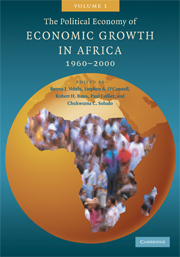Book contents
- Frontmatter
- Contents
- List of figures
- List of tables
- List of contributors
- Foreword
- List of acronyms
- PART 1 OVERVIEW
- PART 2 INTERPRETATION
- 4 Domestic interests and control regimes
- 5 Sacrificing the future: intertemporal strategies and their implications for growth
- 6 The political geography of redistribution
- 7 Political conflict and state failure
- 8 Shocks, risk, and African growth
- PART 3 EXPLANATION
- PART 4 LOOKING AHEAD
- Index
- References
8 - Shocks, risk, and African growth
Published online by Cambridge University Press: 09 January 2010
- Frontmatter
- Contents
- List of figures
- List of tables
- List of contributors
- Foreword
- List of acronyms
- PART 1 OVERVIEW
- PART 2 INTERPRETATION
- 4 Domestic interests and control regimes
- 5 Sacrificing the future: intertemporal strategies and their implications for growth
- 6 The political geography of redistribution
- 7 Political conflict and state failure
- 8 Shocks, risk, and African growth
- PART 3 EXPLANATION
- PART 4 LOOKING AHEAD
- Index
- References
Summary
Introduction: Hamlet without the prince?
Perhaps the most striking fact about the empirical growth literature is that risk, clearly a key determinant of investment behavior, plays only a peripheral role in it. Easterly et al. (1993) had already noted that the growth-regressions literature stresses country characteristics which are relatively stable over time whereas growth rates are very volatile. They concluded that shocks are apparently important relative to country characteristics in determining economic growth.
In the literature on the reasons for poor African growth, risk has long been a key suspect. Collier and Gunning (1999b), in a thematic paper for the AERC project, stressed that there are inherent reasons for Africa to be more risk-exposed (e.g. many African countries face a combination of semi-arid conditions and a very short growing season). In addition, policy regimes in Africa have often left a legacy of poor infrastructure, poor contract enforcement, weak financial sectors, policy uncertainty, and risk of conflict. Governments have thereby both increased the risk to which private agents are exposed and have undermined risk-coping mechanisms.
While there is consensus that risk is an important reason for Africa's poor growth performance, there still is remarkably little evidence. Simply put, the literature provides no firm basis for statements on the quantitative importance of risk for growth.
In section 2 we discuss some basic concepts. The standard growth regression implies, even if it does not include any measures of risk among the regressors, an effect of risk on growth.
- Type
- Chapter
- Information
- The Political Economy of Economic Growth in Africa, 1960–2000 , pp. 297 - 312Publisher: Cambridge University PressPrint publication year: 2007
References
- 2
- Cited by



